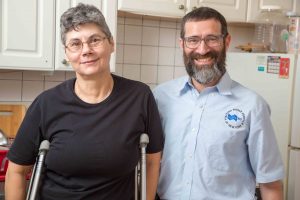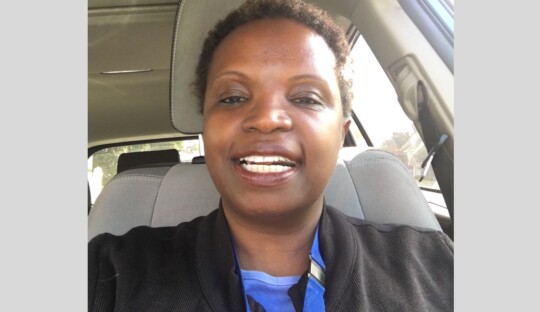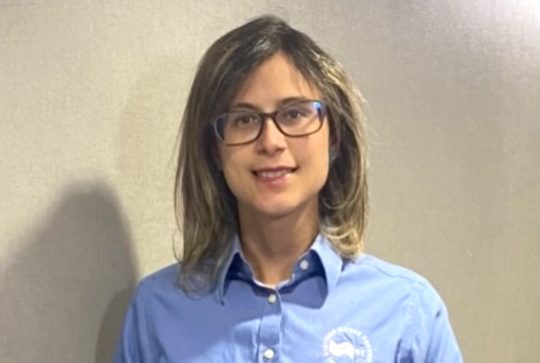A PT with a Positive Attitude that’s “Contagious”: Meet Chaim Backman
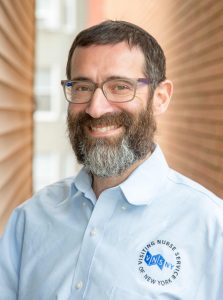 “You never know what you’re going to find when you open the door,” says Chaim Backman, a physical therapist in VNSNY Home Care’s Brooklyn region. It’s this aspect of the job, he notes, that makes it both a challenge and “always interesting.”
“You never know what you’re going to find when you open the door,” says Chaim Backman, a physical therapist in VNSNY Home Care’s Brooklyn region. It’s this aspect of the job, he notes, that makes it both a challenge and “always interesting.”
A Crown Heights resident who moved to New York from Canada at age 11, Chaim always knew he wanted to be in the medical profession. “I’m a people person,” he explains. “I love New Yorkers, and I love doing what I can to make them comfortable in their homes.” This spirit led Chaim to earn a bachelor’s degree in physical therapy from Hunter College in 1996. After working for a time in clinic-based settings, he joined VNSNY in 2008, inspired by a friend who mentioned that VNSNY was a great place to work, and that providing home-based physical therapy was a unique experience and a way to make a noticeable difference for patients.
Having spent the past decade doing in-home therapy in Brooklyn, Chaim knows the borough well, but he’s still amazed by the diversity of living situations and environments that he encounters each day—from walk-ups to high-rise apartment buildings to stand-alone houses. By working with people in their homes, he notes, he can see how to equip them physically to live within their own particular circumstances.
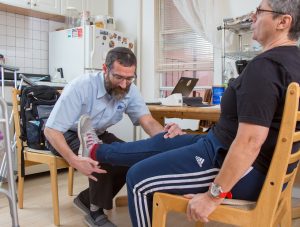 Each case begins with a thorough assessment of what deficits the patient is currently experiencing and how to best address them. “The patient and the therapist need to be on the same page in terms of goals,” he says. “You also have to be able to listen, motivate people, and have a really positive, optimistic outlook. That can be contagious.” It helps that Chaim speaks English, Hebrew and Yiddish fluently, and knows enough words in Spanish, Russian and Polish to communicate key information to patients in those languages as well.
Each case begins with a thorough assessment of what deficits the patient is currently experiencing and how to best address them. “The patient and the therapist need to be on the same page in terms of goals,” he says. “You also have to be able to listen, motivate people, and have a really positive, optimistic outlook. That can be contagious.” It helps that Chaim speaks English, Hebrew and Yiddish fluently, and knows enough words in Spanish, Russian and Polish to communicate key information to patients in those languages as well.
Chaim’s interventions range from targeted assignments like assisting recovery from hip or knee replacement, to general post-surgical care aimed at getting patients back to their previous level of mobility and self-sufficiency. Another area of focus involves making sure patients are safe at home, and that there’s no loose carpeting or other hazards that could lead to falls or other avoidable injuries. “If a patient needs to install basic safety equipment like grab bars, I’ll find out if their insurance covers it,” he says. “If so, then I’ll arrange for them to get the needed equipment. If not, I will instruct the family what to get and how and where to install the needed safety items.”
Chaim’s patients span the entire spectrum of life. He treats elderly individuals with dementia like Noreen*, who, with his support, was able to regain her balance and become more mobile—much to her daughter’s appreciation. Chaim has also treated infants with birth defects, providing a bridge until pediatric early intervention services begin. “This can include doing gentle stretching exercises with the baby, teaching the parents how to position the child to avoid complications, and generally being a source of knowledge and direction on how to safely and properly care for their baby,” he explains.
Chaim typically sees patients twice a week over a period of three to four weeks. In addition to going through the prescribed rehab exercises, he focuses on motivating patients to pursue the goals they set together. “Patients need to understand that they have to actively participate in their own recovery,” he says. “They need to focus on mastering their exercises to become self-sufficient more quickly.”
Chaim also works closely with his interdisciplinary care team’s nurses, occupational therapists, speech therapists and home health aides, as well as practitioners from collaborating organizations as needed. He gives credit to his team manager, Rochelle Pinnock-Herring, for keeping things on track. “Rochelle holds down the fort, and is always available to give us the needed guidance when issues crop up,” he says. Chaim also cites Steven Silverstein, clinical support manager for VNSNY’s rehab physical therapists, as “my go-to guy for all rehab-related issues. He can get the impossible done today.”
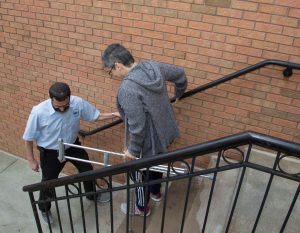 Chaim is consistently impressed by his patients’ will and passion to improve. He recalls how one patient, a former nurse, had full knee-replacement surgery and was experiencing a great deal of pain. Through a daily program of intensive orthopedic therapy Chaim was able to help her regain mobility, and today she’s back to her former healthy self, including walking and swimming. “She really put in a lot of hard work and together we were able to fight through it,” says Chaim. “I was very proud of her.”
Chaim is consistently impressed by his patients’ will and passion to improve. He recalls how one patient, a former nurse, had full knee-replacement surgery and was experiencing a great deal of pain. Through a daily program of intensive orthopedic therapy Chaim was able to help her regain mobility, and today she’s back to her former healthy self, including walking and swimming. “She really put in a lot of hard work and together we were able to fight through it,” says Chaim. “I was very proud of her.”
Committed to giving back, Chaim serves as a volunteer EMT in his Crown Heights neighborhood, where he and his wife raised their four children, all of whom are now in college or graduate school. He also maintains his personal focus on physical conditioning, noting, “I try to stay active, because if you preach it to others, you should be able to follow that guidance yourself.” True to his word, Chaim has participated in a number of marathons and triathlons and is a USA Triathlon Certified Coach. Over the past five years, he has been the team coach for Friendship Circle, a charity that helps children and teens with disabilities. He has trained hundreds of runners to run in the Miami Marathon, held each January. For the 2018 race, Chaim coached 170 runners across the country by remote communications and another 30 Brooklyn-based runners in person—setting workout schedules, dealing with training issues, and calming nerves. Of his 200 athletes, all managed to finish either the half (13.1 mile) or full-length (26.2 mile) course. “It was really very inspiring,” he says.
* The patient’s name has been changed for privacy.
